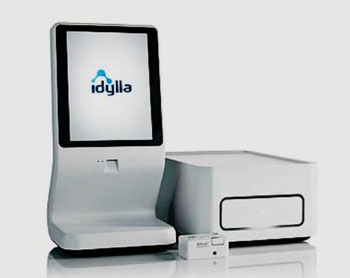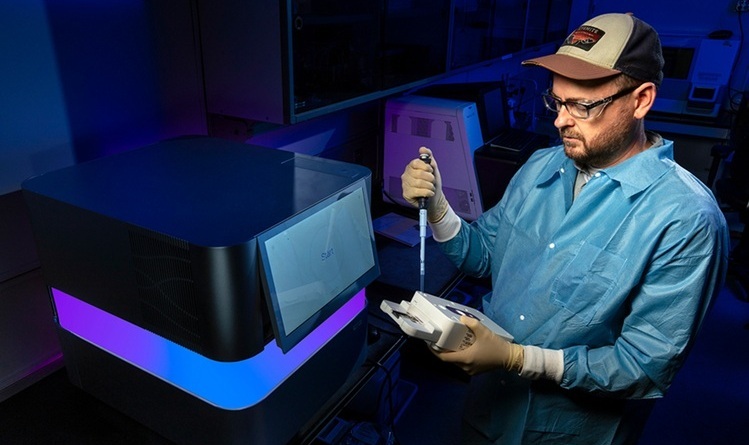Ebola Virus Triage Test Granted Emergency Use Authorization
|
By LabMedica International staff writers Posted on 14 Jun 2016 |

Image: The Idylla fully automated, real-time polymerase chain reaction (rt-PCR) based molecular diagnostics system (Photo courtesy of Biocartis).
The 2014 Ebola virus outbreak in West Africa was the largest outbreak since its discovery 40 years ago and with over 11,000 deaths reported and affecting multiple countries, that outbreak demonstrated a clear need for improved infectious disease surveillance and management.
Today, further preparation is needed, as specialists expect sporadic Ebola virus outbreaks to continue in the future. A molecular diagnostic test for the Ebola Zaire virus has received Emergency Use Authorization (EUA) by the US Food and Drug Administration (FDA, Silver Springs, MD, USA) and may be used to detect Ebola Zaire virus in patients with signs and symptoms of Ebola virus disease.
The Idylla Ebola Virus Triage Test (Biocartis, Mechelen, Belgium) is a real-time reverse transcription polymerase chain reaction (rRT–PCR) test intended for the qualitative detection of ribonucleic acid (RNA) from the Ebola Zaire virus that was detected in the West Africa outbreak in 2014, in Ethylenediaminetetraacetic acid (EDTA) venous whole blood from individuals with signs and symptoms of Ebola virus infection in conjunction with epidemiological risk factors. The test, which delivers results within 100 minutes on a single cartridge, runs on the Biocartis Idylla platform, a fully automated, sample-to-result, real-time RT-PCR system, which allows for rapid deployment in both developed and emerging market countries.
The Idylla Ebola Virus Triage Test sample manipulation is reduced to a single step, i.e. entering the blood sample into the Idylla cartridge, after which the cartridge becomes a hermetically closed container. This reduces the risk of exposure to the Ebola virus for healthcare workers. Furthermore, the Idylla Ebola Virus Triage Test requires only minimal training of healthcare professionals and can be transported and stored at ambient temperature conditions, which enables rapid global deployment during outbreaks. Due to the difficulty in obtaining clinical specimens positive for Ebola, the Idylla Ebola Virus Triage Test was evaluated with limited numbers of contrived specimens spiked with live Ebola Zaire virus RNA.
Rudi Pauwels, PhD, Founder and Chief Executive Officer at Biocartis, said, “The 2014 Ebola and more recently the Zika outbreak, demonstrates that in today’s global world we need rapid, highly accurate and easily deployable diagnostic systems. The Idylla Ebola Virus Triage Test is the first infectious disease outbreak test authorized by the FDA on our Idylla platform, which is perfectly suited for outbreak control through early and fast testing. The test allows healthcare professionals in the field to rapidly diagnose infection, implement control measures and as such, open doors to faster and better treatment decisions.”
Related Links:
US Food and Drug Administration
Biocartis
Today, further preparation is needed, as specialists expect sporadic Ebola virus outbreaks to continue in the future. A molecular diagnostic test for the Ebola Zaire virus has received Emergency Use Authorization (EUA) by the US Food and Drug Administration (FDA, Silver Springs, MD, USA) and may be used to detect Ebola Zaire virus in patients with signs and symptoms of Ebola virus disease.
The Idylla Ebola Virus Triage Test (Biocartis, Mechelen, Belgium) is a real-time reverse transcription polymerase chain reaction (rRT–PCR) test intended for the qualitative detection of ribonucleic acid (RNA) from the Ebola Zaire virus that was detected in the West Africa outbreak in 2014, in Ethylenediaminetetraacetic acid (EDTA) venous whole blood from individuals with signs and symptoms of Ebola virus infection in conjunction with epidemiological risk factors. The test, which delivers results within 100 minutes on a single cartridge, runs on the Biocartis Idylla platform, a fully automated, sample-to-result, real-time RT-PCR system, which allows for rapid deployment in both developed and emerging market countries.
The Idylla Ebola Virus Triage Test sample manipulation is reduced to a single step, i.e. entering the blood sample into the Idylla cartridge, after which the cartridge becomes a hermetically closed container. This reduces the risk of exposure to the Ebola virus for healthcare workers. Furthermore, the Idylla Ebola Virus Triage Test requires only minimal training of healthcare professionals and can be transported and stored at ambient temperature conditions, which enables rapid global deployment during outbreaks. Due to the difficulty in obtaining clinical specimens positive for Ebola, the Idylla Ebola Virus Triage Test was evaluated with limited numbers of contrived specimens spiked with live Ebola Zaire virus RNA.
Rudi Pauwels, PhD, Founder and Chief Executive Officer at Biocartis, said, “The 2014 Ebola and more recently the Zika outbreak, demonstrates that in today’s global world we need rapid, highly accurate and easily deployable diagnostic systems. The Idylla Ebola Virus Triage Test is the first infectious disease outbreak test authorized by the FDA on our Idylla platform, which is perfectly suited for outbreak control through early and fast testing. The test allows healthcare professionals in the field to rapidly diagnose infection, implement control measures and as such, open doors to faster and better treatment decisions.”
Related Links:
US Food and Drug Administration
Biocartis
Latest Microbiology News
- Rapid Sequencing Could Transform Tuberculosis Care
- Blood-Based Viral Signature Identified in Crohn’s Disease
- Hidden Gut Viruses Linked to Colorectal Cancer Risk
- Three-Test Panel Launched for Detection of Liver Fluke Infections
- Rapid Test Promises Faster Answers for Drug-Resistant Infections
- CRISPR-Based Technology Neutralizes Antibiotic-Resistant Bacteria
- Comprehensive Review Identifies Gut Microbiome Signatures Associated With Alzheimer’s Disease
- AI-Powered Platform Enables Rapid Detection of Drug-Resistant C. Auris Pathogens
- New Test Measures How Effectively Antibiotics Kill Bacteria
- New Antimicrobial Stewardship Standards for TB Care to Optimize Diagnostics
- New UTI Diagnosis Method Delivers Antibiotic Resistance Results 24 Hours Earlier
- Breakthroughs in Microbial Analysis to Enhance Disease Prediction
- Blood-Based Diagnostic Method Could Identify Pediatric LRTIs
- Rapid Diagnostic Test Matches Gold Standard for Sepsis Detection
- Rapid POC Tuberculosis Test Provides Results Within 15 Minutes
- Rapid Assay Identifies Bloodstream Infection Pathogens Directly from Patient Samples
Channels
Clinical Chemistry
view channelNew Blood Test Index Offers Earlier Detection of Liver Scarring
Metabolic fatty liver disease is highly prevalent and often silent, yet it can progress to fibrosis, cirrhosis, and liver failure. Current first-line blood test scores frequently return indeterminate results,... Read more
Electronic Nose Smells Early Signs of Ovarian Cancer in Blood
Ovarian cancer is often diagnosed at a late stage because its symptoms are vague and resemble those of more common conditions. Unlike breast cancer, there is currently no reliable screening method, and... Read moreMolecular Diagnostics
view channel
New Blood Test Can Help Predict Testicular Cancer Recurrence
Stage 1 testicular germ cell tumor is typically treated with surgery followed by active surveillance. Although most patients experience strong long-term outcomes, about one in four will see their cancer... Read more
New Test Detects Alzheimer’s by Analyzing Altered Protein Shapes in Blood
Alzheimer’s disease begins developing years before memory loss or other symptoms become visible. Misfolded proteins gradually accumulate in the brain, disrupting normal cellular processes.... Read more
New Diagnostic Markers for Multiple Sclerosis Discovered in Cerebrospinal Fluid
Multiple sclerosis (MS) affects nearly three million people worldwide and can cause symptoms such as numbness, visual disturbances, fatigue, and neurological disability. Diagnosing the disease can be challenging... Read moreHematology
view channel
Rapid Cartridge-Based Test Aims to Expand Access to Hemoglobin Disorder Diagnosis
Sickle cell disease and beta thalassemia are hemoglobin disorders that often require referral to specialized laboratories for definitive diagnosis, delaying results for patients and clinicians.... Read more
New Guidelines Aim to Improve AL Amyloidosis Diagnosis
Light chain (AL) amyloidosis is a rare, life-threatening bone marrow disorder in which abnormal amyloid proteins accumulate in organs. Approximately 3,260 people in the United States are diagnosed... Read moreImmunology
view channel
Immune Signature Identified in Treatment-Resistant Myasthenia Gravis
Myasthenia gravis is a rare autoimmune disorder in which immune attack at the neuromuscular junction causes fluctuating weakness that can impair vision, movement, speech, swallowing, and breathing.... Read more
New Biomarker Predicts Chemotherapy Response in Triple-Negative Breast Cancer
Triple-negative breast cancer is an aggressive form of breast cancer in which patients often show widely varying responses to chemotherapy. Predicting who will benefit from treatment remains challenging,... Read moreBlood Test Identifies Lung Cancer Patients Who Can Benefit from Immunotherapy Drug
Small cell lung cancer (SCLC) is an aggressive disease with limited treatment options, and even newly approved immunotherapies do not benefit all patients. While immunotherapy can extend survival for some,... Read more
Whole-Genome Sequencing Approach Identifies Cancer Patients Benefitting From PARP-Inhibitor Treatment
Targeted cancer therapies such as PARP inhibitors can be highly effective, but only for patients whose tumors carry specific DNA repair defects. Identifying these patients accurately remains challenging,... Read morePathology
view channel
Pathogen-Agnostic Testing Reveals Hidden Respiratory Threats in Negative Samples
Polymerase Chain Reaction (PCR) testing became widely recognized during the COVID-19 pandemic as a powerful method for detecting viruses such as SARS-CoV-2. PCR belongs to a group of diagnostic methods... Read more
Molecular Imaging to Reduce Need for Melanoma Biopsies
Melanoma is the deadliest form of skin cancer and accounts for the vast majority of skin cancer-related deaths. Because early melanomas can closely resemble benign moles, clinicians often rely on visual... Read moreTechnology
view channel
AI Model Outperforms Clinicians in Rare Disease Detection
Rare diseases affect an estimated 300 million people worldwide, yet diagnosis is often protracted and error-prone. Many conditions present with heterogeneous signs that overlap with common disorders, leading... Read more
AI-Driven Diagnostic Demonstrates High Accuracy in Detecting Periprosthetic Joint Infection
Periprosthetic joint infection (PJI) is a rare but serious complication affecting 1% to 2% of primary joint replacement surgeries. The condition occurs when bacteria or fungi infect tissues around an implanted... Read moreIndustry
view channel
Cepheid Joins CDC Initiative to Strengthen U.S. Pandemic Testing Preparednesss
Cepheid (Sunnyvale, CA, USA) has been selected by the U.S. Centers for Disease Control and Prevention (CDC) as one of four national collaborators in a federal initiative to speed rapid diagnostic technologies... Read more
QuidelOrtho Collaborates with Lifotronic to Expand Global Immunoassay Portfolio
QuidelOrtho (San Diego, CA, USA) has entered a long-term strategic supply agreement with Lifotronic Technology (Shenzhen, China) to expand its global immunoassay portfolio and accelerate customer access... Read more








 (3) (1).png)










